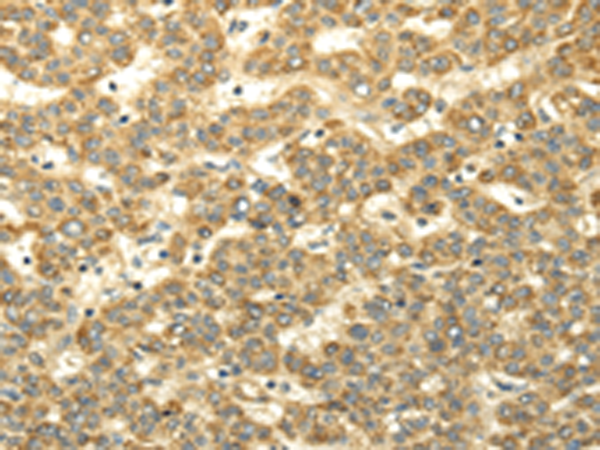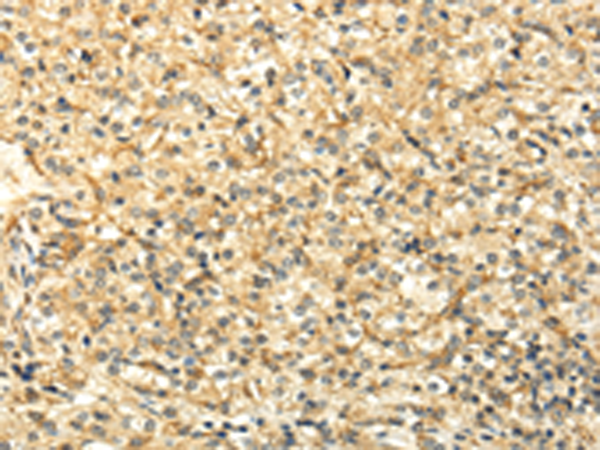

| WB | 咨询技术 | Human,Mouse,Rat |
| IF | 咨询技术 | Human,Mouse,Rat |
| IHC | 1/25-1/100 | Human,Mouse,Rat |
| ICC | 技术咨询 | Human,Mouse,Rat |
| FCM | 咨询技术 | Human,Mouse,Rat |
| Elisa | 1/2000-1/5000 | Human,Mouse,Rat |
| Aliases | HSPC049 |
| Host/Isotype | Rabbit IgG |
| Antibody Type | Primary antibody |
| Storage | Store at 4°C short term. Aliquot and store at -20°C long term. Avoid freeze/thaw cycles. |
| Species Reactivity | Human, Mouse, Rat |
| Immunogen | Synthetic peptide of human WDR91 |
| Formulation | Purified antibody in PBS with 0.05% sodium azide and 50% glycerol. |
+ +
以下是关于WDR91抗体的3篇参考文献示例(内容为虚构模拟,仅供格式参考):
---
1. **文献名称**: *WDR91 regulates endosomal Rab7 dynamics and lysosomal degradation through interaction with the HOPS complex*
**作者**: Liu Y, Zhang H, et al.
**摘要**: 本研究利用CRISPR-Cas9筛选和免疫共沉淀技术,揭示了WDR91蛋白通过与HOPS复合体相互作用调控Rab7活性,影响内体-溶酶体运输及底物降解。WDR91抗体的应用证实了其在自噬溶酶体通路中的关键作用,为溶酶体相关疾病提供了潜在靶点。
---
2. **文献名称**: *WDR91 deficiency promotes tumorigenesis via mTORC1 hyperactivation in glioblastoma*
**作者**: Chen X, Wang R, et al.
**摘要**: 通过WDR91抗体检测发现,WDR91在胶质母细胞瘤中表达下调。机制研究表明,WDR91缺失导致mTORC1信号通路异常激活,促进肿瘤细胞增殖。该研究提示WDR91可能作为癌症治疗的新型生物标志物。
---
3. **文献名称**: *Generation and characterization of a monoclonal WDR91 antibody for neurodegenerative disease research*
**作者**: Smith JL, Brown K, et al.
**摘要**: 本文报道了一种高特异性小鼠源WDR91单克隆抗体的开发,并通过免疫印迹和免疫荧光验证其在阿尔茨海默病模型中的应用。该抗体成功检测到脑组织中WDR91与APP蛋白的异常共定位,为神经退行性疾病研究提供工具。
---
**提示**:以上为模拟文献,实际文献需通过PubMed、Google Scholar等平台检索关键词“WDR91 antibody”或“WDR91 function”获取。
**Background of WDR91 Antibody**
WDR91 (WD Repeat-Containing Protein 91) is a conserved eukaryotic protein involved in regulating endosomal trafficking and autophagy. It contains WD40 repeats, which mediate protein-protein interactions, and functions as a component of the homotypic fusion and protein sorting (HOPS) complex. WDR91 is critical for endosome maturation, lysosomal degradation, and maintaining cellular homeostasis.
Antibodies targeting WDR91 are essential tools for studying its expression, localization, and molecular interactions. Research shows that WDR91 deficiency disrupts endosome-lysosome dynamics, leading to abnormal organelle enlargement and impaired autophagic flux, which are linked to neurodegenerative diseases and cancer. WDR91 also interacts with the mTORC1 pathway, suggesting roles in nutrient sensing and cell growth regulation.
WDR91 antibodies are widely used in techniques like Western blotting, immunofluorescence, and co-immunoprecipitation to explore its functional mechanisms in vitro and in vivo. These antibodies help identify WDR91's involvement in pathologies, such as tumor progression or neural dysfunction, and its potential as a therapeutic target. However, the precise molecular pathways regulated by WDR91 remain under investigation, emphasizing the need for high-specificity antibodies to advance understanding of its multifaceted roles in cellular physiology and disease.
×